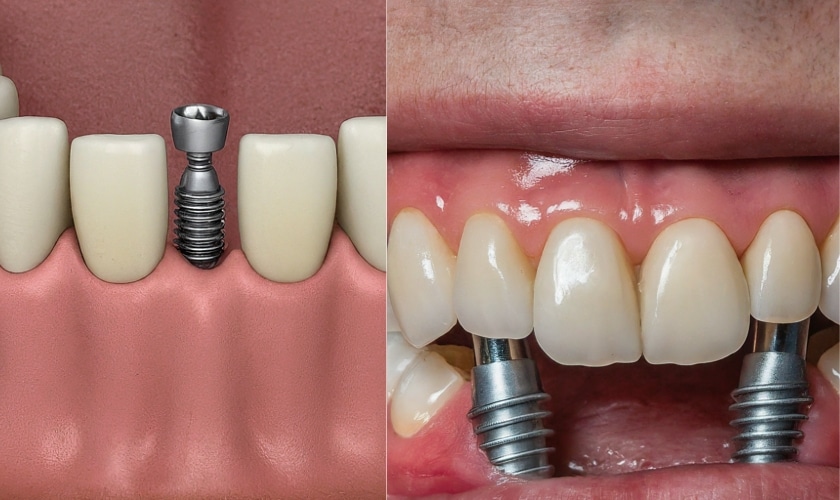Some Known Questions About Dental Sense.
Table of ContentsOur Dental Sense StatementsThe 6-Second Trick For Dental SenseThe Ultimate Guide To Dental SenseThe Facts About Dental Sense Uncovered
are medical devices operatively implanted right into the jaw to bring back a person's capacity to eat or their look. They supply support for man-made (phony) teeth, such as crowns, bridges, or dentures. When a tooth is lost due to injury or condition, an individual can experience issues such as fast bone loss, malfunctioning speech, or modifications to eating patterns that cause discomfort.Dental implant systems include a dental implant body and oral implant joint and might also consist of a joint addiction screw. Root canal procedure. The dental implant body is surgically put in the jawbone instead of the tooth's root. The dental implant joint is usually affixed to the dental implant body by the joint fixation screw and prolongs with gum tissues right into the mouth to sustain the connected man-made teeth
(https://moz.com/community/q/user/dentalsense1)Structure of The Oral Implant System selecting dental implants, talk with your oral service provider regarding the possible benefits and risks, and whether you are a prospect for the procedure. Points to consider: Your overall health and wellness is a crucial element in determining whether you are an excellent prospect for oral implants, how long it will certainly require to recover, and exactly how long the implant might remain in place.
Smoking may influence the healing process and decrease the lasting success of the dental implant. The recovery procedure for the dental implant body may take numerous months or longer, during which time you generally have a short-lived joint instead of the tooth. the oral implant treatment: Thoroughly follow the dental hygiene instructions offered to you by your dental supplier.
The 6-Second Trick For Dental Sense
Implant failing can result in the demand for another surgical procedure to deal with or change the implant system. Brings back the capability to chew Recovers cosmetic look Aids keep the jawbone from reducing because of bone loss Preserves the health and wellness of the surrounding bone and periodontals Aids keep surrounding (nearby) teeth secure Improves lifestyle Damage to surrounding natural teeth throughout dental implant positioning Injury to the surrounding cells during surgical procedure, such as sinus opening Injury during surgical treatment (for instance, fracture of bordering jawbone) Inadequate function, such as seeming like the teeth do not bite together typically A sensation that the tooth is loose or turning in location arising from a joint screw loosening up Implant body failing (looseness of the dental implant body) due to systemic infection, which may be most likely in individuals with unrestrained diabetes as a result of local infection in bone and gums sustaining the dental implant body due to postponed healing, which may be extra most likely in patients that smoke Difficulty cleaning the gums around the dental implant, resulting in bad oral hygiene Without treatment gum illness Post-surgical tingling due to nerve impingement or damage Always alert healthcare companies and imaging service technicians that you have dental implants prior to any magnetic resonance imaging (MRI) or x-ray procedures.
FDA is not familiar with any type of damaging events reported for MRI or x-ray procedures with dental implants. Dental implants systems are commonly made of products that comply with worldwide consensus criteria of the International Company for Standardization (ISO) or ASTM International. These standards have information of what makes a safe material.

A dental implant is a framework that changes a missing out on tooth. With screw-like devices, the doctor inserts an implant right into the jawbone, and it acts as an anchor for an artificial tooth, called a crown.
The Dental Sense Diaries
Some individuals are not eligible for oral implant surgical procedure. It is for oral specialists to operate people with: severe illnessuncontrollable metabolic diseasebone or soft tissue illness or infectionIf these concerns are fixed, an individual can have the surgical procedure. In, oral doctors abstain from operating individuals with: If individuals with any one of the above undertake dental implant surgical treatment, there is a greater danger of the dental implant stopping working.

Oral implant surgical treatment is a personalized process. Provide you time to heal. Attach the post and final crown, bridge or denture.
Next, your specialist will thoroughly place the oral implant into your jaw. Your cosmetic surgeon will certainly rearrange your gums and shut the cut with stitches. If your implant is near the front of your mouth, your dental expert will make a short-lived tooth for you to wear until you recover. This way, you will not have a void in your smile while you recuperate.
Rumored Buzz on Dental Sense
During the healing phase, your jawbone needs to fuse to the dental implant. This procedure can take anywhere from 3 to nine months.
When your dental implant heals, your dental practitioner can attach the abutment (tiny adapter blog post) and your last remediation (crown, bridge or denture). This usually takes regarding one hour to complete and may need a second minor surgical treatment. You should not feel any discomfort throughout your oral implant treatment due to the fact that your service provider will make use of medicine to numb your periodontals.